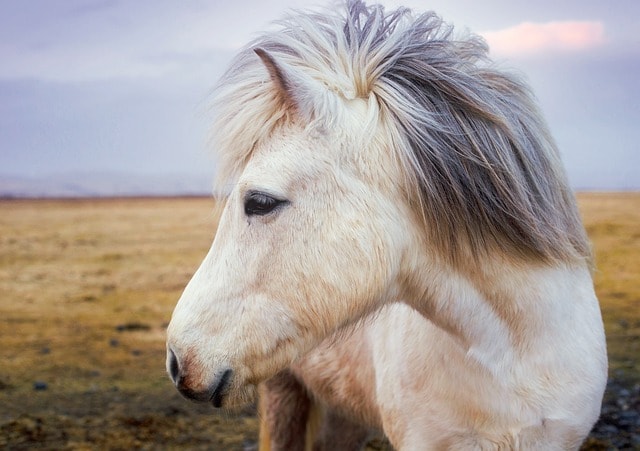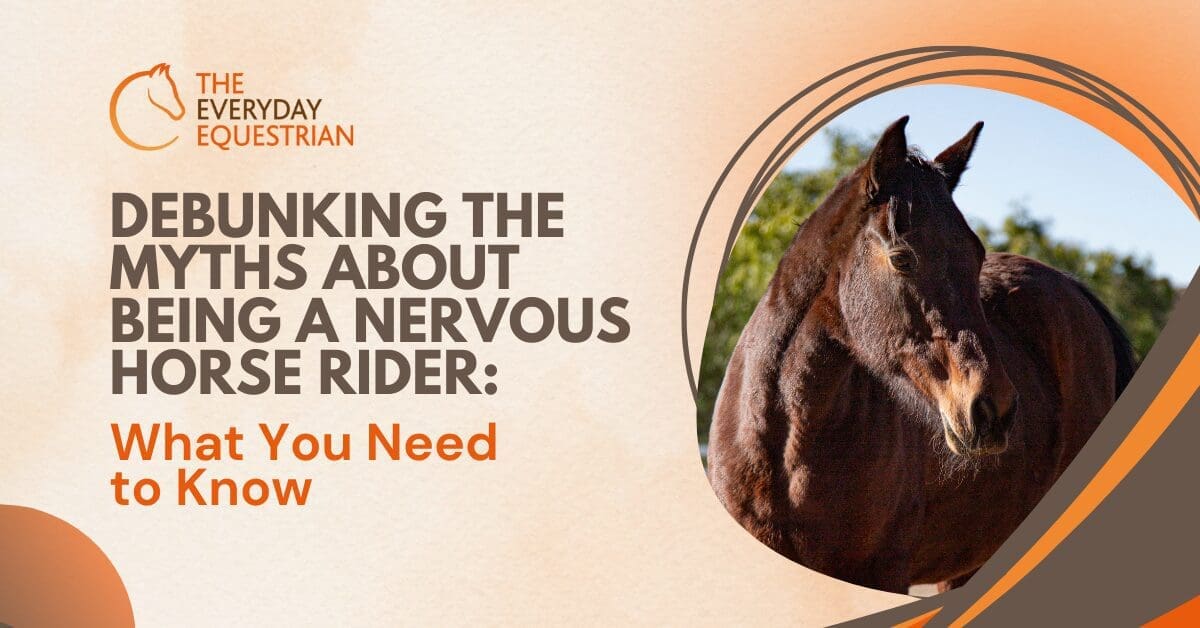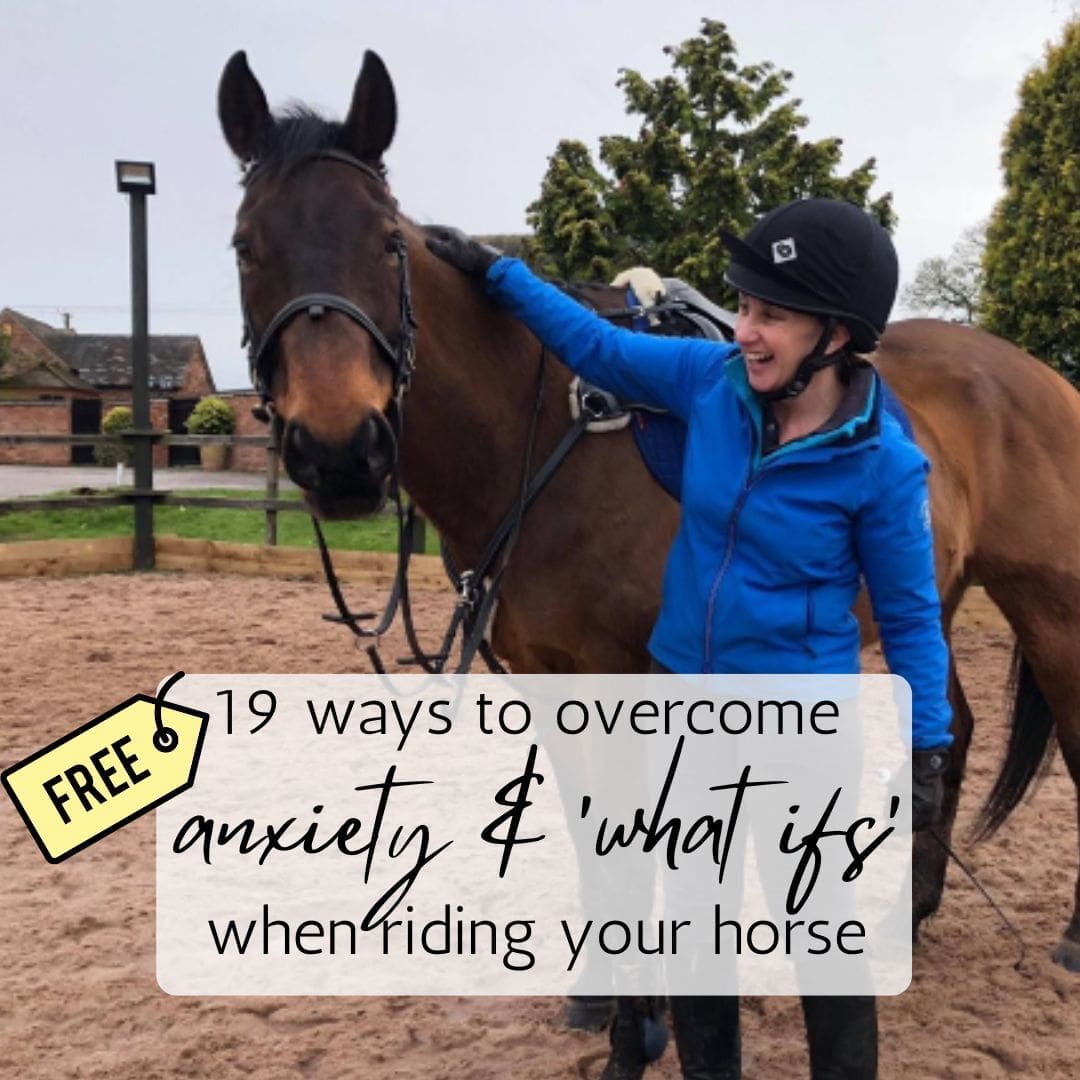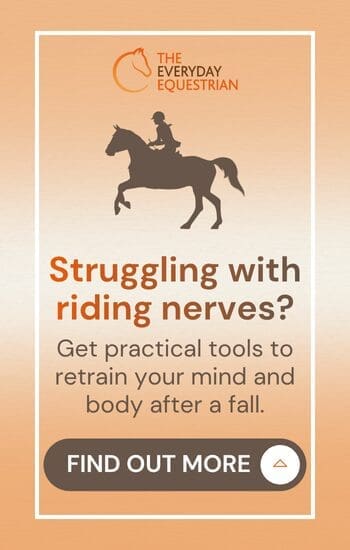Understanding Nervousness in Horse Riding
Are you a nervous horse rider? Are your nerves stopping you from feeling confident as a rider? Today, I’m debunking some of the most common myths about being a nervous horse rider.
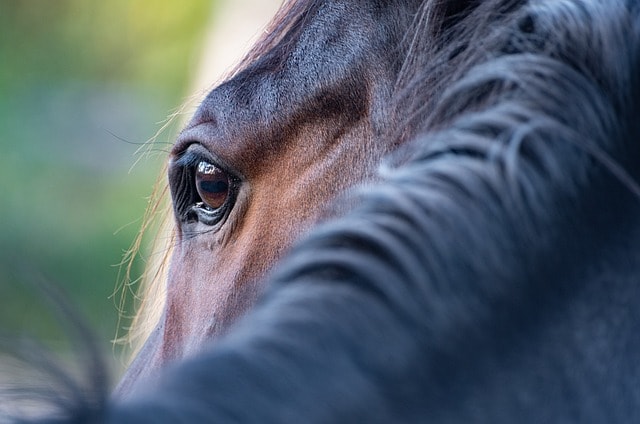
What causes nervousness and negative emotions in horse riding
Feeling nervous as a horse rider is entirely normal! In fact, feeling nervous is simply part of the human experience. We can experience nerves whenever we are faced with a new situation or a situation that our mind might perceive to be a challenge.
As riders, we can also experience nerves following a fall from our horse or when something unexpected has happened, such as our horse spooking or coming across a tractor while hacking out.
Sometimes, we don’t even need to fall off to trigger nerves or feel anxious or scared! A one-off bad riding experience can easily escalate into something much bigger and knock our confidence, which can lead to nervousness or fear.
Our mind is extremely good at predicting the future based on our past experiences, memories, stories, and limiting beliefs, and as riders, we can all too easily imagine those worst-case scenarios that trigger those sensations of nervousness.
Of course, feeling nervous occasionally is no bad thing, as it primes us for action and helps us to ride and perform at our best. Nerves also allow us to experience the exact opposite when we discover the huge high and buzz that happens when we do the very thing that we were nervous about!
Remember that every rider’s experience and level of nervousness will vary, and it really doesn’t matter if you consider yourself a nervous rider; what’s really important is what you do about it so that you can start riding confidently and calmly.
How nervousness affects both you and your horse
When we experience riding nerves, it often results in changes in our riding position. We often hold our breath, tip forward in our upper body, grip up with our legs, and shorten and pull on the reins.
Inevitably, as a prey animal, our super-perceptive horse will pick up on our changing emotions, which will often result in our horse becoming anxious and nervous, creating an unfortunate spiral of stress and nervousness for both of us! This change in our riding position is sometimes called the ‘foetal position’, where we instinctively and unconsciously move in response to fear to protect the major internal organs. Unfortunately, this really doesn’t help; at best, this can make us feel unstable in the saddle, and at worst, tell our horse that they should be worried and anxious too!
The good news is that you can learn to let go of the struggle and worry about feeling nervous. (And yes, feeling worried about feeling nervous is absolutely a thing!). To help you start to overcome your nervousness around riding, let’s explore some common equestrian myths about feeling nervous so that you can begin to feel more calm and confident when riding your horse.
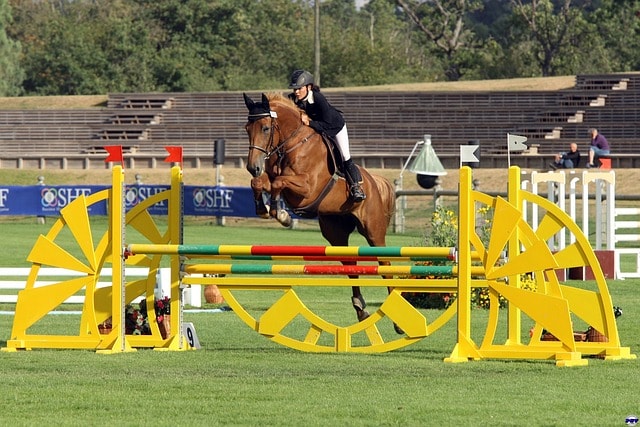
Separating Fact from Fiction: Myths About Feeling Nervous
Myth 1: Feeling nervous is bad
The great thing about nerves is that they actually prepare you for action, to perform at your best and to make progress toward your goals. We often talk about nerves as being a problem in the sense that they can be a self-reinforcing habit, which makes us doubt our ability as riders.
The interesting thing is that the physical symptoms we experience, such as racing heart, quick, shallow breathing, sweating, jelly legs, etc., are exactly the same as when we experience excitement. So, it can be as simple as labelling your experience differently.
What’s really important here is how we respond to physical sensations and the trick our mind plays on us; we can choose to label them differently and change our perception of the situation so we can regain full control of ourselves. And who wouldn’t want that, right?
Myth 2: If you’re nervous, you’re not prepared.
Sometimes, horse riders can mistake their experience of nerves for not being ready to do whatever they want to do. Interestingly, there is often a range of limiting beliefs with underlying feelings of ‘not being good enough’ in some way (which is ridiculous, but we’ll talk about that another time!) or ‘I can’t do this’ (plus many other examples that I won’t go into right now).
You can absolutely be fully ready and prepared to do something with your horse and still experience a sense of nervous excitement.
Think about elite eventers entering the start box at Badminton or Burghley; most will admit to feeling nervous as they hear the countdown. In fact, I think it was the great Andrew Nicholson who said, “If you don’t feel nervous in the start box at a big event, then you shouldn’t be doing it”!
Of course, thorough preparation and training for yourself and your horse, across the range of ridden and psychological skills, will help you feel confident and provide the unconscious part of your mind with real, factual evidence that you are more than capable ).
Myth 3: Nervousness can’t be controlled.
I have to say that this is nonsense! With the right mindset tools and techniques, it’s entirely possible to learn to manage our nerves so that we can achieve our equestrian goals and dreams. I’ve read of riders who have given up riding altogether because of their negative emotions about riding, and it makes me terribly sad. I promise you that it doesn’t have to be this way.
As riders, we can learn to manage our mindset and confidence so that we can have the best adventures with our horses. I believe there are three key steps to managing our response to uncomfortable emotions:
- Acknowledge how we feel. When we become more self-aware, we begin to notice changes in our emotions and thoughts. It’s impossible to change anything without being aware of it, so take a moment to ask yourself, “What am I feeling right now?” It can be useful to follow up with, “Is how I’m feeling helping me or hindering me?” There are no right or wrong answers here; it’s simply about observing our experiences.
- Accept how we feel. Rather than comparing ourselves to others (or indeed a past version of ourselves), beating ourselves up for what we think we should or shouldn’t do, and listening to that critical inner voice, simply acknowledging and accepting that we are feeling a certain way is hugely powerful. Remember, nothing lasts forever, and our human physiology means that emotions have evolved to ebb and flow over time.
- Action. Nothing changes if nothing changes. Action is essential to changing our experience at any given moment, but it doesn’t mean diving in at the deep end! Action can be something as small as slowing down your breathing or changing the focus of your eyes. It could be deciding to take the pressure off yourself and trying again another day. It could be booking some lessons with your Coach. It could be sitting up and riding forward. It could be seeking help with your mindset and confidence challenges. Your choices are limitless! The key is that you do something that will help you move forward, even when that is in teeny tiny steps.
Myth: You can get rid of nerves completely
Our unconscious mind is brilliant, and its primary purpose is to keep us safe and in one piece so the human race can survive! With that in mind, our mind craves certainty and guarantees, and it triggers uncomfortable feelings when situations or outcomes are uncertain. The trouble is that virtually everything in life is uncertain!
Nerves, anxiety, and those pesky ‘what ifs’ all stem from the mind’s ability to scan for potential threats, whether real or imagined. Our mind is a ‘prediction machine’, constantly scanning in the background for hazards and risks. Let’s face it, without this particular skill, the human race would never have survived!
So what can we as riders do to manage these essential, sometimes unhelpful, processes?
It’s important to remember that nerves are a valuable part of our experience; they’re a sign of learning, growing, developing and stretching our comfort zone. When we are able to manage our nerves on our own terms, we can begin to replace them with more helpful and constructive ways of feeling and thinking about horse riding.
Myth: Nervousness is a sign of weakness.
Nervousness is a sign of being human, nothing more, nothing less. When riders think that they’re ‘weak’ or that they ‘should’ feel differently about riding in some way, they are simply sabotaging their self-belief and self-confidence.
Being overly critical or judgemental about ourselves (and other people, to be fair!), triggers a spiral of negative thinking, where we get ‘stuck in the problem’ instead of seeking out potential solutions and ways forward.
There are also strong links between this critical voice and self-judgement, with our sense of identity as a rider. Our unconscious mind is always listening, so the words that we say to ourselves either in our head or out loud, has a massive impact on how we feel and what we believe to be true about ourselves and our horse.
So, saying that nervousness is a sign of weakness is, at best, horrible and, at worst, detrimental to our self-worth.
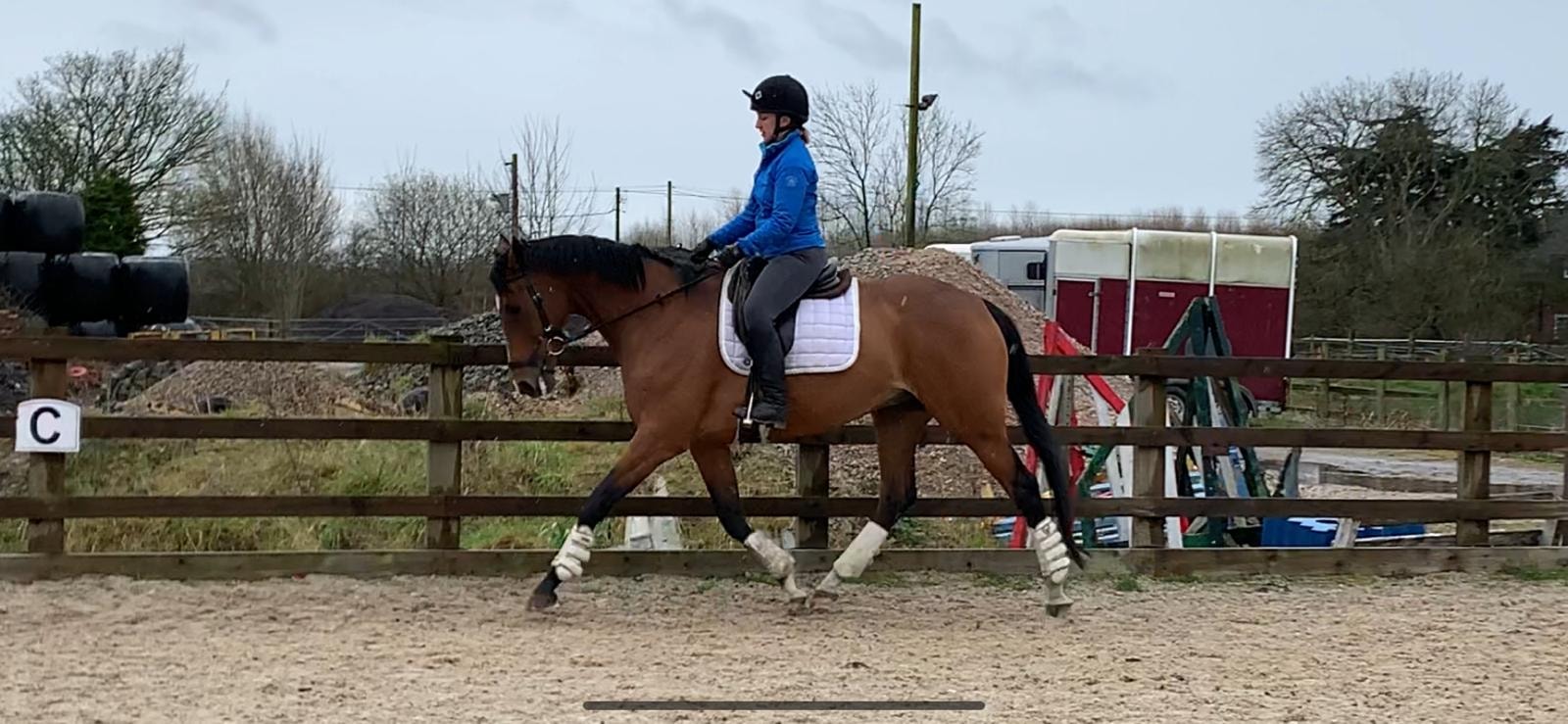
Managing Nervousness in the Saddle
How to stay calm and focused while horse riding
When we’re nervous, we ride defensively and almost wait to see what our horse does or doesn’t do next. It can make us feel a bit like a passenger at the whim of our horse! Nobody wants to feel like that, right?
One of the simplest and most effective ways to feel more confident is to change your physiology. Sit back on your seat, bring your shoulders back, look up ahead, and relax and lengthen your legs. Pause for a moment, slow down your breathing, drop your shoulders down away from your ears and broaden your visual focus.
Bring yourself back into the present, grounding yourself in the moment so that you can take stock, redirect the blood flow back to the rational part of your brain, and discover the options and opportunities available to you right now.
Tips for nervous riders to improve their performance
Bringing your attention and focus on what you can control takes you away from judgmental thinking. For example, taking a moment to slow down your thinking and look for alternative perspectives can have a huge impact on how well you ride.
Give yourself a checklist and focus on the process of doing a certain movement or activity. Talk yourself through each step out loud, as if explaining to your horse what you’re doing and why you’re doing it. Of course, speaking or singing will make you breathe, too!
There are so many tips, tools, and techniques to help you manage nerves as a rider, get curious about learning different strategies, and find what works for you and your horse. To manage nerves effectively and confidently, you need to make your mindset, confidence and riding performance a priority. Make yourself just as important as your horse (which I know is a challenge for lots of riders!). If you can’t do it for yourself, do it for your horse. I promise he’ll thank you for it!
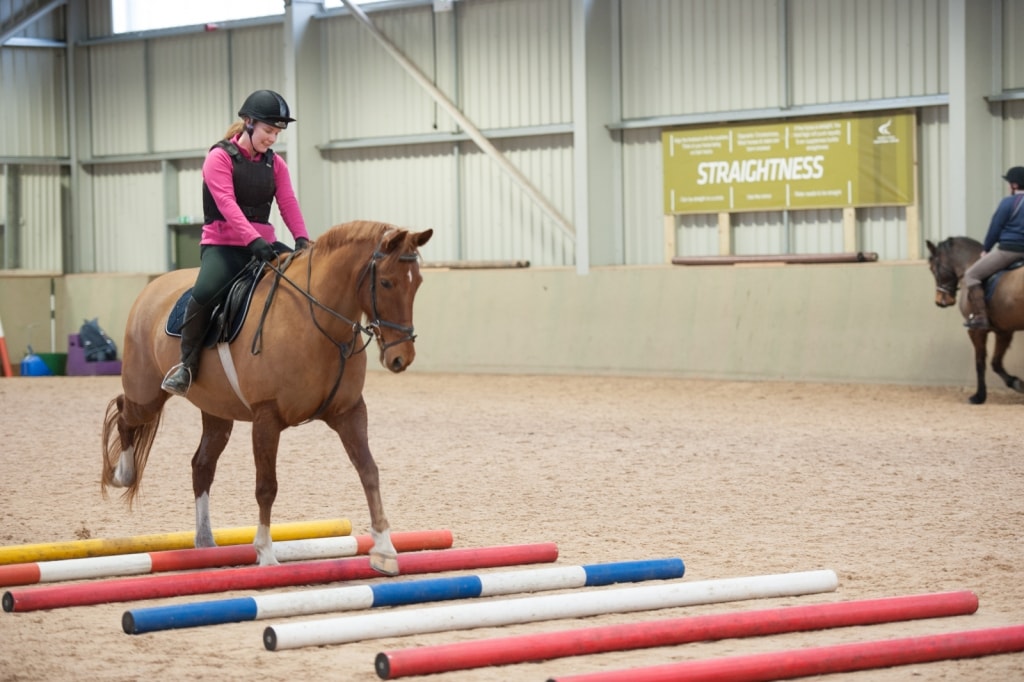
Conclusion
You are not alone as a nervous horse rider
Horse rider nerves are a really common problem that can affect riders at all levels and with a range of experiences, but you really don’t have to keep hold of those uncomfortable emotions. I’ve worked with hundreds of riders who have learned how to dissolve worry, nerves, ‘what ifs’, anxiety, fear, and a whole lot more, and find themselves doing more of what they love riding their horse.
Taking the first step towards a more confident ride
Remember, it’s okay to feel nervous, and it’s normal to have negative thoughts. with the right strategies and support, you can overcome them and become a more confident horse rider.
